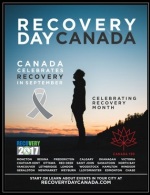We the North: Rethinking Addiction & Recovery in Canada

By Erik Haines
 Last year, I wrote a short essay inspired by the recovery advocate and UK-based writer Stephen Bamber. The general purpose of my article was to distinguish and contrast some of the critical differences between public health, addiction treatment, and recovery advocacy efforts developing in the UK, Australia, Canada, and the United-States.
Last year, I wrote a short essay inspired by the recovery advocate and UK-based writer Stephen Bamber. The general purpose of my article was to distinguish and contrast some of the critical differences between public health, addiction treatment, and recovery advocacy efforts developing in the UK, Australia, Canada, and the United-States.
Following its publication and several personal communications with various stakeholders across the United-States and Canada, I was stunned by the overall lack of historical and theoretical material on the evolution of the field of public health, addiction treatment and recovery in Canada. This second essay, like the first, is effectively my ongoing effort to capture and narrate this evolving theoretical and unfolding historical development in Canada.
As I described in my first essay, Canada (like many other nations) has been facing a rising health and drug crisis to epidemic proportions. In fact, according to recent statistics from Health Canada, more than 12,800 people have died from opioid and other related drug complications since January 2016. Given this dire situation, a growing resistance and intellectual awakening have started to take place in various pockets across the country to address this ever-increasing problem and tragedy as a new generation of leadership has been tentatively emerging.
These new vanguards – as I briefly described in my original article – live and breathe in new digital mediums and are coming from a wide range of life experiences, priorities, institutions, and professional backgrounds to examine and develop new approaches to the current health and drug epidemic crisis. These various individuals and groups – spanning movements such as the recovery advocacy, mutual aid fellowships, addiction treatment, public health (incl. harm reduction) and mental health – are slowly developing a shared vision and language around the evolving concepts of “recovery”, “meaning”, “health” and “self-determination” which seems to be driving a system and theoretical transformation for the delivery of healthcare and political discourse in Canada.
 Inspired by the new recovery advocacy movement that developed in the 1990’s in the United-States, through organizations such as Faces and Voices of Recovery and pioneering figures like William L. White, Ernie Kurtz and (now) Dr. John Kelly from the Recovery Research Institute – Canada has seen an explosion of recovery advocacy activity and the development of recovery branded events and institutions across the country. In fact, this year the recovery capital conference – a joint effort between the addiction treatment industry and recovery advocates – saw its events grow from a single city in BC in 2016, to over 6 cities and provinces in 2019, and featuring keynote global speakers such as Gabor Mate, Johann Hari, and David Sheff. Additionally, the Premier of Alberta, Jason Kenny, took the opportunity at the Calgary event and conference to announce the investment of $140 million to improve addiction treatment and recovery-based services in Alberta.
Inspired by the new recovery advocacy movement that developed in the 1990’s in the United-States, through organizations such as Faces and Voices of Recovery and pioneering figures like William L. White, Ernie Kurtz and (now) Dr. John Kelly from the Recovery Research Institute – Canada has seen an explosion of recovery advocacy activity and the development of recovery branded events and institutions across the country. In fact, this year the recovery capital conference – a joint effort between the addiction treatment industry and recovery advocates – saw its events grow from a single city in BC in 2016, to over 6 cities and provinces in 2019, and featuring keynote global speakers such as Gabor Mate, Johann Hari, and David Sheff. Additionally, the Premier of Alberta, Jason Kenny, took the opportunity at the Calgary event and conference to announce the investment of $140 million to improve addiction treatment and recovery-based services in Alberta.
This political maneuver by the newly elected United Conservative Party of Alberta and the private addiction treatment industry didn’t go unnoticed by Donald Macpherson – the Executive Director of the Canadian Drug Policy Coalition (CDPC) – in the lead-up to this year’s federal election. Without very much delay, the CDPC membership base – along with various mutual-aid community groups – began to express their discontent on social media and took their message to traditional outlets to broadcast their preferred policy-based approaches and support for their political parties of choice. Yet as disheartening as this progressive and conservative bickering across the public health, addiction treatment and recovery advocacy movement in western Canada might be – we should not let it overshadow some of the new and exciting emergent developments in other regions of the country.
Canada is world-renowned for its complicated relationship with the United-States and its linguistic, cultural, and political regional differences that contributed to its development and eventual confederation. At various times over its history, this has created multiple fractions of eastern and western forms of alienation and political discourses. That said, a similar pattern seems to be emerging as to its response to the growing public health and substance use crisis that as spread across North America in recent years.
As briefly highlighted above, Western Canada (i.e. British Colombia, Alberta, Saskatchewan, and Manitoba) seem to have wholeheartedly embraced a harm reduction, private addiction treatment, and recovery-oriented system of care approach to this crisis – though it has been highly conflictual and politized at times. Interestingly, however, Eastern and central Canada (i.e. Ontario and Quebec) seem to be moving in a slightly different direction and are adopting a public health approach deeply informed by mental health and whole-person care medicine delivered by our public healthcare system – as can be ascertained by this year’s recovery-focused conference in Ontario and the third international congress on whole-person care medicine held at McGill University, in my home town of Montreal, Quebec.
Granted, integrating addiction medicine and mental health recovery initiatives have been underway for decades. Yet, since 2010, ten of the thirteen provinces and territories in Canada have adopted an integrated mental health and addiction medicine framework, with varying degrees of specificity in their visions of recovery. Though integrating addiction medicine and mental health concepts into one theoretical model for a shared vision of recovery and well-being has become a normative topic of discussion amongst policy wonks – Canada’s healthcare system is far from being able to deliver these services through its current public healthcare infrastructure. This vacuum of services and support, needless be said, has left many individuals, families and marginalized communities from across the country to cope on their own for decades, and in many cases, left in the deep shadows of our national and collective conscience.
 This collective and social malaise has led to the rise of many Canadian intellectuals and academics to comment, theorize, and ultimately attempt to propose solutions to this national tragedy in recent years. A few of the most stimulating names that come to mind and would be worthy of elaborate commentary within this context and their contribution to this evolving and unfolding story in Canada would be: 1) Dr. Bruce K. Alexander 2) Dr. Gabor Mate 3) Dr. Donald Macpherson and 4) Dr. Marc Lewis. Yet as intriguing as all these figures might be, I believe one in particular needs to be singled out from the rest due to his recent rise to fame, and that would be Dr. Jordan B. Peterson. However, I will leave the details of that subject and controversial topic for another article.
This collective and social malaise has led to the rise of many Canadian intellectuals and academics to comment, theorize, and ultimately attempt to propose solutions to this national tragedy in recent years. A few of the most stimulating names that come to mind and would be worthy of elaborate commentary within this context and their contribution to this evolving and unfolding story in Canada would be: 1) Dr. Bruce K. Alexander 2) Dr. Gabor Mate 3) Dr. Donald Macpherson and 4) Dr. Marc Lewis. Yet as intriguing as all these figures might be, I believe one in particular needs to be singled out from the rest due to his recent rise to fame, and that would be Dr. Jordan B. Peterson. However, I will leave the details of that subject and controversial topic for another article.
Erik Haines is a Canadian Public Health Advocate, Information Professional, & Knowledge Management Consultant currently living in Montreal, Quebec.























I hope you are singling out Jordan Peterson because he is a such a terrible figure even though he is wildly popular.
Hi Lisle,
Peterson is certainly a controversial figure. But like you said, he is a tremendously popular figure & is having a big influence on many young people entering recovery today – for good or for worse. In any event, this is the reason why I choose to write about him – glad to hear you thought the post to be thought-provoking.
Wow. That was a fine 10K view of emerging patterns. Thx for posting the article.
Hi Larry,
Thanks for the reply & feedback. Glad you enjoyed the post 🙂
I hope that politics and money and other peoples agenda don’t derail this endeavor.
Thoughts of othe past movements come to mind. The Washingtonians and the Oxford group.
Hi Richard,
Yes, like William White as written & tried to warn us about – history certainly could repeat itself if we are not careful. Thanks for the reply. I hope you enjoyed the post.
Last summer, I interviewed a person for the AA Beyond Belief podcast who was originally from Vancouver and who was familiar with the opioid epidemic in that city. He explained to me how the safe injection sites started in Vancouver and how successful they have been at saving lives.
This person then moved to Toronto where they have also stared safe injection sites. There are legal injection sites in Toronto that are regulated and monitored by the government, but the need is so great that many pop-up sites have also emerged. These sites aren’t technically legal, but law enforcement leaves them alone.
Say what you will about harm reduction, but the fact is that these safe injection sites prevent death from overdose and in my opinion they make sense.
There are no safe injection sites in the US which seems to take a very punitive stance toward addicts. If there are any injection sites that are operating underground, they must be very secretive because US law enforcement will not tolerate them. It’s cruel in my opinion and it makes no sense when there is evidence that safe injection sites save lives. Just look north of the border, but no in the US reason and science won’t often win the day.
I don’t know how the Canadian public feels about these sites, and I am sure they come with problems. However, you can’t help an addict when they are dead, and safe injection sites keep people alive so that hopefully one day, they will be helped.
Hi John,
Thanks for the reply – I’m a big fan of your work & podcast. The growing view and consensus seem to be evolving towards a whole-person medicine and recovery-oriented theory of care approach which includes a harm reduction phase. Though, there is still a tremendous amount of work to be done. That said, I would be more than glad to personally connect or come on your podcast to discuss at some point.
You got it! That would be awesome. You can email me at john@aabeyondbelief.org and we can set it up.
Amazing! 🙂 E-mail you shortly – till then.
I did enjoy the post. Dialogue is what I love.
Jason Kenny and Jordan Peterson, two of the biggest Conservative Cons jobs out there !! Where there is blood there are sharks.
Hi Dan. Thanks for the reply/comment. I am glad to see that my post/essay got your creative & critical juices going. I was hoping that it would stir some debate.